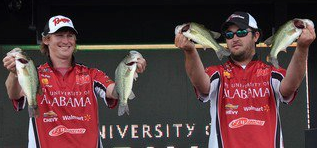Looking for a leisurely day on the water? You won’t find it as a member of Alabama’s competitive fishing team.
This little known UA team competes for national accolades year in and year out, and it’s not football. The club fishing team has been collecting awards since its establishment in 2006.
“We, as a team, have competed very well in the past few national championships and have placed numerous top-5 finishes in other large tournaments,” said Dustin Connell, three-time University of Alabama Angler of the Year.
The team won the first national championship in its inaugural season of 2006 and recently has had many top finishes. The 24-member team took fourth place in the College Bass National Championships in July and placed fourth at the SEC FLW College Championship, qualifying the team for the national championships in the spring.
Like any other sport, there is a system of ranking the top teams nationwide. The Association of Collegiate Anglers system is recognized as being the most efficient and accurate, according to head angler Logan Johnson. Alabama is currently ranked ninth out of 500 teams.
The team’s events also often get broadcasted nationwide. The main networks to tune in and watch are NBC Sports and ESPNU. The team will compete Dec. 23 at 1 p.m. on NBC Sports.
“I would have to say that the media exposure that we receive has to be the most exciting part about it,” angler Keith Kirkley said. “The tournament that stands out to me the most is the recent national championship at Pickwick Lake, where our team received a lot of television time.”
The sport of competitive fishing is one that starts at a young age for anglers who fish local tournaments and gain sponsors by working their way up the ranks. Because of NCAA regulations about amateur status, this makes it difficult for the sport to become NCAA sanctioned.
But with the high cost of tournaments fees, boat, equipment and travel expenses, these sponsorships are essential for anglers to stay competitive and potentially turn professional. Alabama, for example, has sponsors like Duckett Rods, Guy Harvey and Striking Lure.
Some anglers fear that if it does become part of the NCAA, it would hurt the sport because gaining sponsors and recognition are a key factor in starting from a young age. Johnson agrees that some changes need to be made by both sides to ensure members can still have the ability to get exposure to help their career.
“I think, eventually, fishing will become an NCAA sport because of how much it is growing. Every year, the team grows larger and larger,” Connell said.
A big part of the team is the competitiveness of members, every one of whom want to be the best angler in the country. However, another aspect is the comradery. The sport season is from February until the end of May, with a tournament almost every weekend. The team becomes an extended family, members said.
“I joined the fishing team at Alabama because it was a great learning opportunity, learning to fish different lakes and learning how to compete at national tournaments,” said Connell. “I also made a lot of friends by joining the team. A lot of the guys on the team are my best friends now.”









